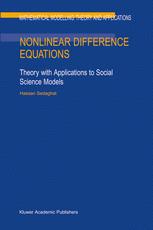

Most ebook files are in PDF format, so you can easily read them using various software such as Foxit Reader or directly on the Google Chrome browser.
Some ebook files are released by publishers in other formats such as .awz, .mobi, .epub, .fb2, etc. You may need to install specific software to read these formats on mobile/PC, such as Calibre.
Please read the tutorial at this link: https://ebookbell.com/faq
We offer FREE conversion to the popular formats you request; however, this may take some time. Therefore, right after payment, please email us, and we will try to provide the service as quickly as possible.
For some exceptional file formats or broken links (if any), please refrain from opening any disputes. Instead, email us first, and we will try to assist within a maximum of 6 hours.
EbookBell Team

5.0
78 reviewsIt is generally acknowledged that deterministic formulations of dy namical phenomena in the social sciences need to be treated differently from similar formulations in the natural sciences. Social science phe nomena typically defy precise measurements or data collection that are comparable in accuracy and detail to those in the natural sciences. Con sequently, a deterministic model is rarely expected to yield a precise description of the actual phenomenon being modelled. Nevertheless, as may be inferred from a study of the models discussed in this book, the qualitative analysis of deterministic models has an important role to play in understanding the fundamental mechanisms behind social sci ence phenomena. The reach of such analysis extends far beyond tech nical clarifications of classical theories that were generally expressed in imprecise literary prose. The inherent lack of precise knowledge in the social sciences is a fun damental trait that must be distinguished from "uncertainty. " For in stance, in mathematically modelling the stock market, uncertainty is a prime and indispensable component of a model. Indeed, in the stock market, the rules are specifically designed to make prediction impossible or at least very difficult. On the other hand, understanding concepts such as the "business cycle" involves economic and social mechanisms that are very different from the rules of the stock market. Here, far from seeking unpredictability, the intention of the modeller is a scientific one, i. e.